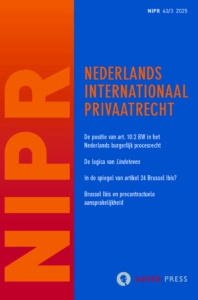Views
XLK v XLJ: Comity Beyond the Child Abduction Convention
By Haoxiang Ruan, PhD candidate at Hitotsubashi University (Tokyo, Japan). Haoxiang Ruan consistently maintains an interest in international family law, which led him to undertake the 2024-2025 academic stay at Kyoto University (Kyoto, Japan).
From the perspective of state participation, the Convention of 25 October 1980 on the Civil Aspects of International Child Abduction (the “Child Abduction Convention”) stands as one of the most successful instruments of the Hague Conference on Private International Law (HCCH), boasting 103 Contracting Parties to date. This widespread adherence is largely driven by the pervasive—and increasingly difficult-to-ignore—problem of international child abduction, which affects even non-Contracting States. China, a populous country deeply engaged in globalization, exemplifies this reality. A recent custody ruling in Singapore concerned a child who had been brought to the country by his father in breach of an order issued by a Chinese court—an incident underscoring how cross-border family disputes transcend the formal boundaries of the Convention.
Conflict of laws in the South African courts: a recent missed opportunity
Posted on behalf of Jason Mitchell, barrister at Maitland Chambers in London and at Group 621 in Johannesburg.
It’s rare for conflict of laws to come up in South African courts (with the notable exception of the Turkcell litigation from earlier this year; see the summary on this site at https://conflictoflaws.net/2025/south-africa-grapples-with-the-act-of-state-doctrine-and-choice-of-law-in-delict/).
Reciprocity and the Enforcement of Foreign Judgments in Egypt – A Critical Assessment of a Recent Supreme Court Decision

I. Introduction
Reciprocity is probably one of the most controversial requirements in the field of the recognition and enforcement of foreign judgments. While its legitimacy appears to be on the wane (see Béligh Elbalti, “Reciprocity and the Recognition and Enforcement of Foreign Judgments: A Lot of Bark but Not Much Bite,” 13 JPIL 1 (2017) 184), reciprocity can still strike hard – particularly when it is applied loosely and without sufficient consideration.
The case presented here, decided by the Egyptian Supreme Court (Appeal No. 11434 of 21 June 2025), provides a good illustration. Despite the Court’s well-established case law imposing certain restrictions on the use of the reciprocity requirement, this recent judgment shows that, when not applied with the necessary rigor, reciprocity can still produce significant effects that undermine the legitimate expectations of the parties.
News
Dutch Journal of PIL (NIPR) – issue 2025/3
The latest issue of the Dutch Journal on Private International Law (NIPR) has been published. It contains the following contributions.
NIPR 2025, Issue 3
Editorial
Mathijs ten Wolde / p. 421
Articles
Steven Stuij, De positie van art. 10:2 BW in het Nederlands burgerlijk procesrecht / p. 423-444
Abstract
Article 10:2 of the Dutch Civil Code stipulates that the rules of private international law as well as the applicable law designated by those rules are to be applied ex officio. There has been a debate as to the positioning of this provision in relation to other rules of civil procedure on party autonomy as a result of two cases of the Dutch Supreme Court (‘Hoge Raad’). This contribution will address Read more
Public consultation on a possible new HCCH convention
Just 10 days left to participate in the public consultation on the Draft Text of a possible new HCCH convention on parallel proceedings and related actions!
The public consultation, launched on 18 November 2025, will close on 26 January 2026 at 9.00 a.m. CET. Experts, practitioners and judges from diverse legal traditions with experience in cross-border litigation and private international law more broadly are encouraged to participate in the consultation.
In 2021, the HCCH established a Working Group on matters related to jurisdiction in transnational civil or commercial litigation (WG), comprised of over 60 subject-matter experts from across the globe. The WG, after nine meetings, has developed a Draft Text containing provisions aimed at addressing parallel proceedings and related actions taking place in multiple States, acknowledging the primary roles of both jurisdictional rules and the doctrine of forum non conveniens. The objective of this future instrument would be to enhance legal certainty, predictability, and access to justice by reducing litigation costs and mitigating inconsistent judgments in transnational litigation in civil or commercial matters.
The public consultation seeks feedback on whether the Draft Text would, in practice, assist in addressing such matters and how the provisions in the Draft Text could be improved. The consultation is supported by a Consultation Paper comprising an Executive Summary, a detailed explanation of the key provisions and the operation of the Draft Text, and specific questions.
Responses received from this consultation will be submitted to all HCCH Members for consideration in advance of the next meeting of the Council on General Affairs and Policy (CGAP), the governing body of the HCCH, in March 2026, at which the Members of the HCCH will decide on the next steps for the project.
For more information on the public consultation, please visit: https://www.hcch.net/en/projects/legislative-projects/jurisdiction/public-consultation
This post is published by the Permanent Bureau of the Hague Conference of Private International Law (HCCH).

International Society of Family Law (ISFL) World Conference 2026 – Istanbul
The 19th World Conference of the International Society of Family Law (ISFL) will take place in Istanbul, Türkiye, from 9 to 12 September 2026. The conference will be hosted by Pîrî Reis University at its Marine Campus in Tuzla, offering a distinctive coastal setting for this major event.
The theme of the conference is “Family Law & Vulnerability.”
The conference will explore how family law engages with different forms of vulnerability across diverse legal systems and social contexts. Contributions addressing the theme from comparative, interdisciplinary, theoretical or practice-oriented perspectives are welcomed.
The deadline for abstract submission has been extended to 20 February 2026. Abstracts may be submitted for paper presentations (including jointly authored papers) as well as for organized panels. Detailed submission guidelines are available on the conference website.
Conference registration will open in late February 2026. Registration fees for participation in the scientific program are as follows:
- ISFL members: €400 (early bird) / €450 (regular)
- Non-members: €500 (early bird) / €550 (regular)
- Participants from low-income countries: €250 (early bird) / €300 (regular)
The early bird rates will apply until 1 May 2026. Registration fees cover access to the scientific sessions of the conference; social events will be subject to separate registration and fees.
The conference venue, Tuzla, is located on the Asian side of Istanbul and is conveniently close to Sabiha Gökçen International Airport, which serves numerous international and domestic flights. Tuzla is well connected to other parts of the city by public transport.
A list of recommended hotels on the Asian side of Istanbul will be published on the conference website in due course, providing a range of accommodation options with convenient access to the venue by public transport.
Further information on registration procedures, accommodation and the conference program will be made available on the official conference website: www.isfl2026.org.


